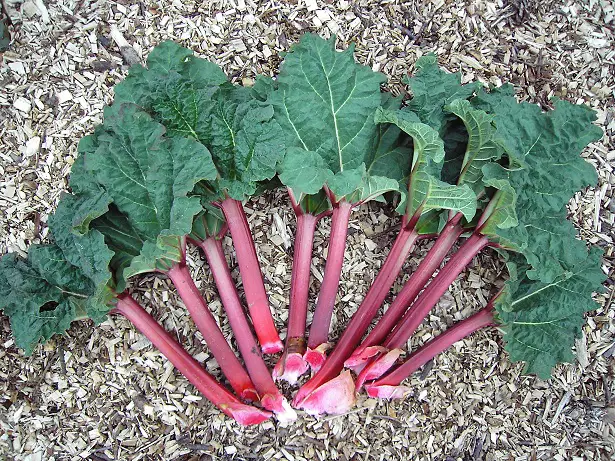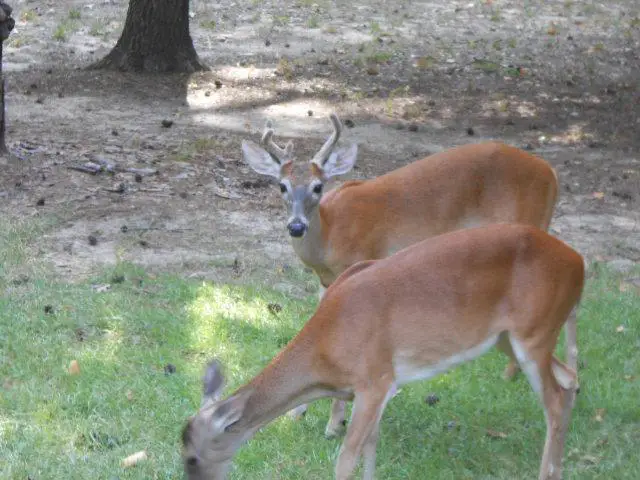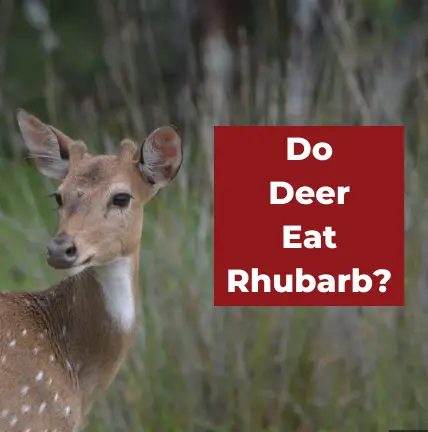Deer are known for their appetites and can cause serious damage to gardens and crops. Gardeners often wonder: do deer eat rhubarb? While deer will eat almost anything when they are hungry enough, rhubarb is generally not one of their preferred food sources and is considered a deer-resistant plant.
The leaves of the rhubarb plant contain oxalic acid, which is toxic to both humans and animals. This makes rhubarb leaves unpalatable to deer, and they are unlikely to eat them unless they are desperate for food.
We’ll go further in-depth about whether deer will eat rhubarb and how to deter them from doing so in this guide.
What Is Rhubarb?

Rhubarb is a plant that is grown for its edible stalks. It is a perennial plant that is commonly grown in cool and temperate climates.
The plant is known for its large, green leaves that are heart-shaped and its thick, red stalks that are used in cooking. Rhubarb is often used in pies, jams, and other desserts.
The stalks of rhubarb are the only part of the plant that is edible. The leaves are toxic and should not be consumed.
The stalks are tart in flavor and are often combined with sugar to make them more palatable. Rhubarb is a good source of vitamin C and dietary fiber.
Rhubarb is a hardy plant that can survive in a variety of soil types. It prefers soil that is rich in organic matter and well-drained.
The plant can be propagated by dividing the rootstock or by planting seeds. Rhubarb plants can grow up to three feet tall and four feet wide.
Do Deer Eat Rhubarb?

Many gardeners wonder if deer will eat rhubarb and damage their crops.
Deer can eat practically anything if they are hungry enough, but rhubarb is generally considered to be a deer-resistant plant. The green leaves of the rhubarb plant contain oxalic acid and glycosides that can cause gastrointestinal problems in both deer and humans. As a result, deer tend to avoid the leaves and even if they nibble on them, they tend to avoid the edible stalks.
While rhubarb is not completely deer-proof, it is definitely one of the more deer-resistant plants that you can grow. In fact, many gardeners use rhubarb as a natural deterrent to keep deer out of their gardens.
It’s worth noting that if deer are starving or there are no other sources of food available, they may eat rhubarb. If they eat large amounts of rhubarb, it can also be fatal to them.
Why Rhubarb Is Deer Resistant
Rhubarb is a popular garden plant that is known for its tart, edible stalks. One of the reasons why rhubarb is so popular among gardeners is that it is deer-resistant. Here are some reasons why rhubarb is not a favorite food of deer:
- Toxic Leaves: Rhubarb leaves contain high levels of oxalic acid, which can be toxic to both deer and humans. Deer tend to avoid plants that have a bitter or unpleasant taste, and the toxic leaves of rhubarb make it an unappealing choice for them.
- Strong Odors: Certain cultivars of rhubarb have a strong, pungent odor that can be off-putting to deer. Plants with strong odors, such as onions, garlic, and fennel, are generally not palatable to deer.
- Texture: Rhubarb stalks have a tough, fibrous texture that can be difficult for deer to digest. This can make them less appealing to deer, especially if they have other food sources available.
While no plant is completely deer-proof, rhubarb is definitely one of the more deer-resistant plants that you can grow.
Deer Damage to Rhubarb Plants
Rhubarb is a delicious plant that is enjoyed by many people. However, it is not one hundred percent immune to deer damage. Deer can cause significant damage to rhubarb plants, especially during the early spring when food sources are scarce.
In this section we’ll discuss how to identify deer damage to rhubarb plants and how to prevent it.
Identifying Deer Damage to Rhubarb
Deer can cause damage to rhubarb plants in a number of ways. Some common signs of deer damage include:
- Browsing damage: Deer can eat the leaves and stems of rhubarb plants, which can cause significant damage to the plant.
- Trampling damage: Deer can trample on rhubarb plants, which can break the stems and leaves and damage the roots.
- Rubbing damage: During the fall, deer rub their antlers on trees and shrubs, which can damage rhubarb plants that are nearby.
If you suspect that your rhubarb plant has been damaged by deer, it is important to act quickly to prevent further damage.
Preventing Deer Damage to Rhubarb
There are several ways to prevent deer damage to rhubarb plants. Check out our guide on how to keep deer away from your garden where we cover 25 quick and easy tips and natural deer repellants for keeping hungry deer away from plants.
Check out our other helpful wildlife guides while you’re here:

